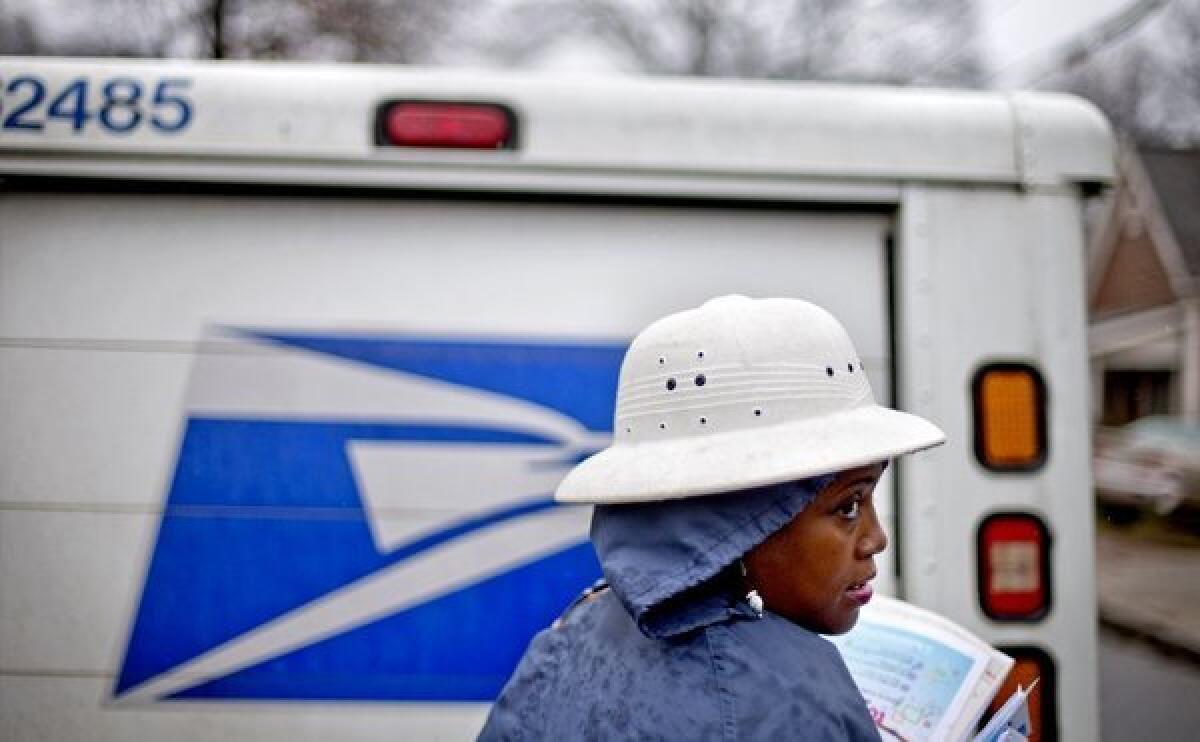Congress still hates the U.S. Postal Service

- Share via
Two Sundays ago I was roused from my midday stupor by the doorbell. I staggered to the door to discover a big box from Amazon deposited on the stoop, and a U.S. Postal Service truck just rounding the corner on its way to make another Sunday delivery. “What the --?” I asked.
The delivery, as I was presently to learn, was the harbinger of the Postal Service’s new deal with Amazon for Sunday delivery of the online retailer’s packages in big cities. It’s a brilliant move that serves both the partners and customers too. It builds on the Postal Service’s reach in parcel delivery -- the USPS performs the same last-mile service in many communities for UPS and FedEx -- and provides it with a new source of revenue.
But it doesn’t solve the service’s most significant problems, which contributed to its $5-billion loss in the latest fiscal year, reported late last week. One problem is the secular decline in first-class mail, which is unlikely to recover its bygone volume.
But the bigger problem is the enduring hostility to the USPS shown by many conservatives in Congress. It’s because of them that the USPS has maxed out its statutory borrowing authority and faces an annual payment of $5.5 billion into a health fund for its future retirees. The service defaulted on that obligation last year and this year, but it shows up as a liability on its balance sheet and destroys its financial flexibility.
In real terms it’s an obnoxious fiction imposed by a cynical Congress in 2006. Barring the unnecessary healthcare payments, the postal service’s deficit would be manageable -- $5 billion is a bit more than one-tenth of 1% of the federal budget.
We examined the reasons for this congressional hostility last year. As we wrote at the time: “What could explain conservative hostility toward the U.S. Postal Service? After all, most members of Congress, Republican or Democrat, will defend to the death the smallest one-room post office in their district.
“But what about the characteristics of the workforce? It’s heavily and effectively unionized, for one thing. For another, over a long period, the post office has been a reliable steppingstone to the middle class for African American families. (Black workers make up about 11% of the USPS payroll, about twice their representation in the overall workforce.) Maybe some people just think these workers are expendable.”
Things haven’t changed since then. This year’s loss is an improvement over last year’s, when the red ink came to $16 billion, but it’s folly to think that the USPS should turn a profit or even break even.
Congressional conservatives in particular like to argue that the USPS should operate like a business -- if it can’t make money delivering mail to the far-flung corners of the country, it should stop trying. This is the sort of idea that could only be hatched by smug, comfortable politicos and pundits with offices in downtown Washington, D.C., who couldn’t find, say, Supai, Arizona, with a road map. Remote as it is, Supai is entitled to postal delivery at the same flat rate as you pay to deliver to Dupont Circle.
That’s why the post office was written in to the U.S. Constitution -- at the time it was seen as a crucial governmental function binding the nation together. It still is. Treating universal mail service as something that should compete profitably with commercial carriers or die is not only foolhardy, it’s probably unconstitutional. Congress should get over the idea. The Postal Service still covers the whole country, and if it can’t do so without running a deficit, the country should pony up.
More to Read
Inside the business of entertainment
The Wide Shot brings you news, analysis and insights on everything from streaming wars to production — and what it all means for the future.
You may occasionally receive promotional content from the Los Angeles Times.









